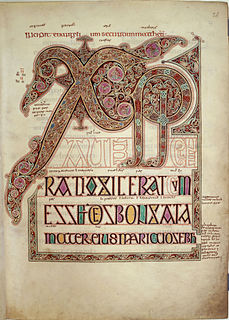
Year 762 (DCCLXII) was a common year starting on Friday of the Julian calendar. The denomination 762 for this year has been used since the early medieval period, when the Anno Domini calendar era became the prevalent method in Europe for naming years.

Year 647 (DCXLVII) was a common year starting on Monday of the Julian calendar. The denomination 647 for this year has been used since the early medieval period, when the Anno Domini calendar era became the prevalent method in Europe for naming years.
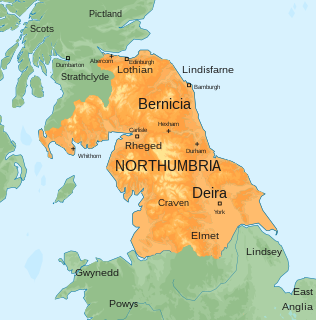
The Kingdom of Northumbria was a medieval Anglian kingdom in what is now Northern England and south-east Scotland. The name derives from the Old English Norþan-hymbre meaning "the people or province north of the Humber", which reflects the approximate southern limit to the kingdom's territory, the Humber Estuary. Northumbria started to consolidate into one kingdom in the early seventh century, when the two earlier core territories of Deira and Bernicia entered into a dynastic union. At its height, the kingdom extended from the Humber, Peak District and the River Mersey on the south to the Firth of Forth on the north. Northumbria ceased to be an independent kingdom in the mid-tenth century, though a rump Earldom of Bamburgh survived around Bernicia in the north, later to be absorbed into the medieval kingdoms of Scotland and England.

Aldfrith was king of Northumbria from 685 until his death. He is described by early writers such as Bede, Alcuin and Stephen of Ripon as a man of great learning. Some of his works and some letters written to him survive. His reign was relatively peaceful, marred only by disputes with Bishop Wilfrid, a major figure in the early Northumbrian church.
Æthelwold was a common Anglo Saxon name. It may refer to:
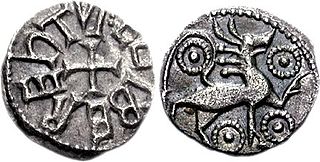
Eadberht was king of Northumbria from 737 or 738 to 758. He was the brother of Ecgbert, Archbishop of York. His reign is seen as a return to the imperial ambitions of seventh-century Northumbria and may represent a period of economic prosperity. He faced internal opposition from rival dynasties and at least two actual or potential rivals were killed during his reign. In 758 he abdicated in favour of his son Oswulf and became a monk at York.
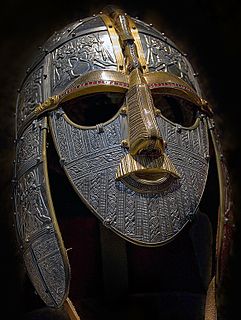
In the seventh century the pagan Anglo-Saxons were converted to Christianity mainly by missionaries sent from Rome. Irish missionaries from Iona, who were proponents of Insular Christianity, were influential in the conversion of Northumbria, but after the Synod of Whitby in 664 the English church gave its allegiance to the Pope.

Rædwulf was king of Northumbria for a short time. His ancestry is not known, but it is possible that he was a kinsman of Osberht and Ælla.

The Bishop of Durham is the Anglican bishop responsible for the Diocese of Durham in the Province of York. The diocese is one of the oldest in England and its bishop is a member of the House of Lords. Paul Butler has been the Bishop of Durham since his election was confirmed at York Minster on 20 January 2014. The previous bishop was Justin Welby, Archbishop of Canterbury. The bishop is one of two who escort the sovereign at the coronation.
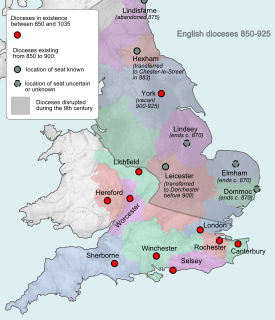
Dommoc, a place not certainly identified but probably within the modern county of Suffolk, was the original seat of the Anglo-Saxon bishops of the Kingdom of East Anglia. It was established by Sigeberht of East Anglia for Saint Felix in c. 629–31. It remained the bishopric of all East Anglia until c. 673, when Theodore of Tarsus, Archbishop of Canterbury, divided the see and created a second bishopric at either North Elmham, Norfolk, or South Elmham, Suffolk. The see of Dommoc continued to exist until the time of the Viking Wars of the 860s, after which it lapsed.
Eadwulf is an Anglo-Saxon male name. Notable people with the name include:
Swithwulf is an Anglo-Saxon male name borne by several men.
Events from the 9th century in England.
Events from the 8th century in England.
Events from the 7th century in England.

Aidan of Lindisfarne Irish: Naomh Aodhán was an Irish monk and missionary credited with restoring Christianity to Northumbria. He founded a monastic cathedral on the island of Lindisfarne, known as Lindisfarne Priory, served as its first bishop, and travelled ceaselessly throughout the countryside, spreading the gospel to both the Anglo-Saxon nobility and the socially disenfranchised.
Eadred Lulisc or Eadred of Carlisle is the abbot of Carlisle recorded by the Historia de Sancto Cuthberto. The Historia gives the abbot central place in the election of Guthred as king of Northumbria by the Viking army based in Yorkshire, and that subsequently Eadred purchased land from him, using it to endow the bishopric of St Cuthbert. The Historia also related that he and Eardwulf, Bishop of Lindisfarne, moved the body of St Cuthbert away from its previous base at Lindisfarne, tried to take it to Ireland, but failed and took it back to the east, first to Crayke and then to Chester-le-Street.
The Christianisation of Anglo-Saxon England was a process spanning the 7th century. It was essentially the result of the Gregorian mission of 597, which was joined by the efforts of the Hiberno-Scottish mission from the 630s. From the 8th century, the Anglo-Saxon mission was, in turn, instrumental in the conversion of the population of the Frankish Empire.
Billfrith is an obscure Northumbrian saint credited with providing the jewel and metalwork encrusting the former treasure binding of the Lindisfarne Gospels. His name is thought to mean "peace of the two-edge sword".
This page is based on this
Wikipedia article Text is available under the
CC BY-SA 4.0 license; additional terms may apply.
Images, videos and audio are available under their respective licenses.
